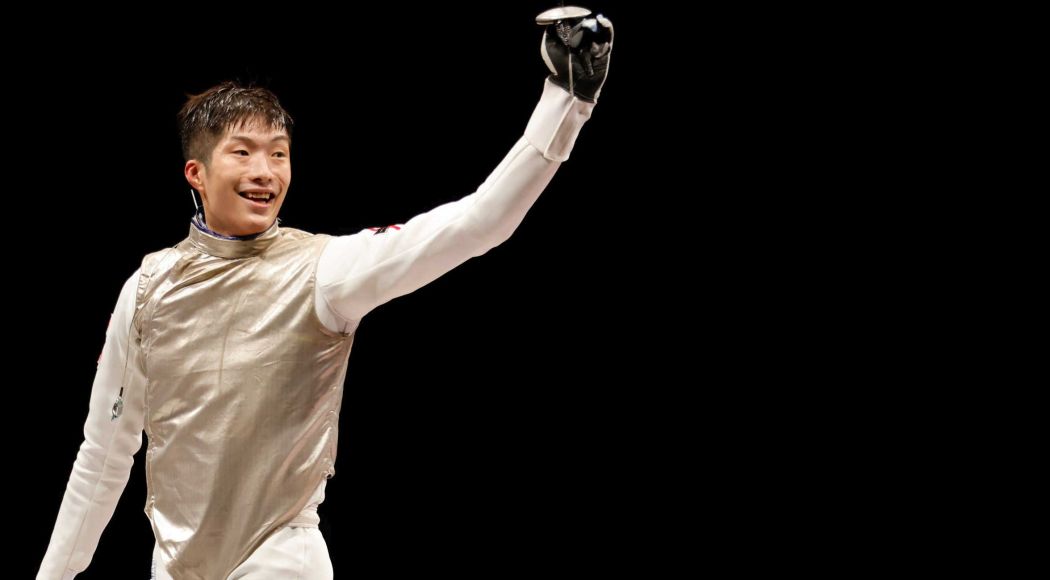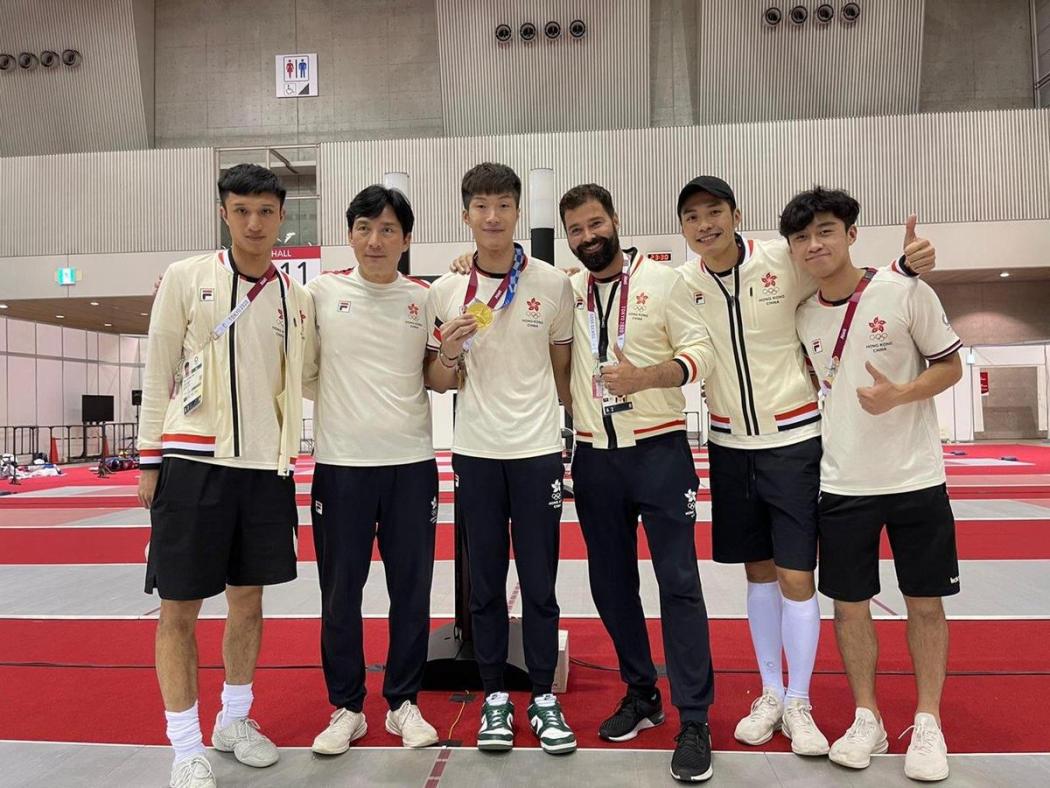Hong Kong men’s foil fencer Edgar Cheung Ka-long – who became an Olympic champion in Tokyo on Monday, ending the city’s 25-year gold medal drought – credits meditation for the feat which has made him a household name.
Fervent crowds in Hong Kong hailed the 24-year-old as a “Fencing God” and marvelled at his ability to remain unshaken at crunch times, especially in a thrilling quarter-final that almost dashed Cheung’s dreams of an Olympic podium.

In an interview with HKFP two days after his historic victory, the Olympic hero revealed it was his mindfulness meditation practice – using YouTube videos – that helped him regain composure at critical moments in his bouts.
The nightly meditation habit which Cheung practises on his bed began just six months ago, when he was struggling to find his feet after dropping out of the world’s top 16 for the first time in almost six years.

Cheung, who ranks 19th internationally, said he was willing to “give everything a try” at the time to salvage his fencing career. As he hit play on a five-minute Cantonese meditation guide titled “Relieve anxiety, believe in the future,” he shut his eyes and immersed himself in a space without distractions from his phone.
“I actually just follow guided meditation clips on YouTube and try not to think about anything. It clears my mind and makes me feel more at peace,” Cheung said on Wednesday.
That state of mind was pivotal when Cheung was down by five points against Kirill Borodachev of the Russian Olympic Committee in the quarter-finals. The Hongkonger made an incredible comeback and snatched victory with a score of 15-14 to advance into the top four.
By that point, Cheung had already achieved what no other Hong Kong fencers had done. But he did not stop there – he went on to defeat Alexander Choupenitch of the Czech Republic and 2016 Olympic champion Daniele Garozzo to clinch the long-awaited gold for the city.
Although it has been more than 48 hours since he was crowned champion, the gold medallist told HKFP he was still in a state of disbelief. “Actually, I still don’t know what is going on. It still feels like a dream… it was a day of miracles.”

It can let people know that we Hongkongers can do it too.
Edgar Cheung
While Cheung was settling into his new world title, he has become the man of the hour as Hongkongers celebrated the victory. The men’s foil individual gold medal match attracted hundreds of people to a large television screen at APM mall in Kwun Tong to back the home favourite, with many holding placards that read “Support Hong Kong team.”
The fencing hall at the Hong Kong Sports Institute was also filled with euphoria on Monday, as Cheung’s team members jumped up and down and shrieked when the Olympian made history. The left-hander has cemented his position as a role model for the city’s budding fencers.
The number of followers Cheung had on Instagram saw an explosive rise from around 45,000 to over 347,000, and counting. His inbox was also swamped with more than 10,000 congratulatory messages, the fencer estimated.
Cheung said he was very grateful for the immense support shown by people back home, saying watching videos of the cheering crowds gave him goose bumps. The accolade was more than just a personal validation, he said.
“It can let people know that we Hongkongers can do it too.”

This echoed his remarks when he was interviewed by former windsurfer Lee Lai-shan after his win. Lee, who earned Hong Kong’s first Olympic gold medal at the Atlanta games in 1996, told Cheung that she had waited more than twenty years for someone to fill her shoes as an Olympic gold medallist.
The fencer responded by saying he was “not even born yet” when Lee claimed victory: “[People should not] think that Hong Kong is just a small city and it’s hard to compete with countries. As long as you give it your best, you can still do it: don’t give up.”
Cash prize
People in Hong Kong also showed great interest in Cheung’s prize money, which is estimated to amount to at least HK$7.5 million, on top of some lifetime privileges such as free MTR rides and free chicken wings.

Asked how he plans to spend the cash incentive, Cheung said he has not yet given it thought: “I better prepare myself for the [team] competition first and I will think about it later.”
The men’s foil individual champion added he has a tradition of buying mugs when he competes overseas as mementos for his family, saying it felt like he was bringing home some “trophies.” For his trip to Tokyo this time, however, Cheung’s family would certainly be happy to find themselves receiving a more unusual, shiny souvenir.
From boy to man
Cheung – who stands at 1.93 metres tall and is the son of two basketball players – was meant to follow in the footsteps of his parents. But as fate would have it, his training on the court was cut short when he was 10 after classes were cancelled. Cheung’s father then suggested his son pick up a sword and give fencing – which was still a niche sport at the time – a go.
The long-limbed fencer made a name for himself in 2014 when he swept four gold medals at the Asian Junior and Cadet Fencing Championships. In 2016, he was crowned the Asian champion – this time at senior level – at the age of 18. In the same year, Cheung made his Olympic debut in Rio de Janeiro and finished in the top 16.
He continued to expand his success on the world stage, as he won the junior men’s foil event at the 2017 Junior and Cadet World Fencing Championships in Plovdiv, Bulgaria. Despite his youth the Hongkonger was already among the best 16 fencers in the world.
Cheung managed to maintain his ranking for subsequent seasons, until 2020/2021. Its loss was a heavy blow to the elite fencer.
“I doubted myself – was this is the best I could ever go? Was I unable to go any further?” Cheung recalled.

But French coach Greg Koenig, who trained the Chinese Taipei team before coming to Hong Kong in late 2018, taught Cheung to loosen up and constantly gave him inspiration to experiment with new techniques on the piste.
“I used to be very stubborn, but now, after long chats with my coach, it’s better,” he said.
Koenig led the Hong Kong men’s foil team to a historic silver at a World Cup in St Petersburg, Russia in May, 2019. It paved the way for the team’s successful qualification for the Tokyo Olympics.
The Frenchman had described Cheung’s march to Olympic glory as transforming the 24-year-old from “a boy” to “a man.” He also praised the fencer for his perseverance and hard work.
“Ka-long made history today and I couldn’t be more proud…” Koenig wrote on Instagram on Tuesday.
Aside from Koenig, Cheung said another coach, Maurizio Zomparelli, has helped him build much better strength. His fitness regimen included weight training and riding on the wattbike, as well as agility exercises to sharpen his footwork.
‘Don’t lose your way’
While Cheung was thrilled to reach the pinnacle of his career, he did not let himself become overwhelmed by excitement. The fencing champion said he only took one day off on Tuesday and jumped back into training the following day, as he and his teammates are seeking to vie for another fencing medal for Hong Kong in the team event on Sunday.

With Hongkongers seeing the four men’s foilists as their medal hope, Cheung said he did not feel any extra pressure: “We will simply keep a normal mentality, and give it my best shot.”
As the team counts down to competition day, Cheung shared a photo of his white and gold Nike fencing shoes, with a handwritten line that read: “CKL, don’t lose your way.”
Support HKFP | Policies & Ethics | Error/typo? | Contact Us | Newsletter | Transparency & Annual Report | Apps
Help safeguard press freedom & keep HKFP free for all readers by supporting our team

LATEST FROM HKFP
HKFP has an impartial stance, transparent funding, and balanced coverage guided by an Ethics Code and Corrections Policy.
Support press freedom & help us surpass 1,000 monthly Patrons: 100% independent, governed by an ethics code & not-for-profit.











